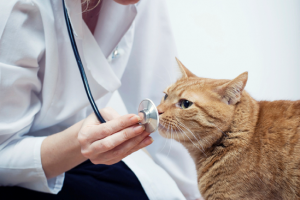You’ve heard it many times – your pet should see a veterinarian at least once a year for a preventive health visit or an annual wellness exam. But what if you don’t think there’s anything wrong? Why is this necessary? Is it really necessary?
Say Yes to the Preventive Health Care Visit!
You might not realize how important this regular physical check-up is to your pet’s health. The veterinarians commonly find signs of disease, and when found early, something can be done: more diagnostic tests might be needed and then medical treatment or surgery can be done in a timely fashion.
A long and healthy life. That’s what we all want and that’s why the preventive health exam is one of the best things you can do for your pet!
WHY?
As veterinarians we want to help animals, to care for animals, and to make them better. Every day we see pets that have diseases or conditions that could have been prevented – either altogether, or at least prevented from being so debilitating.
Pets age more quickly than people do. They have a faster metabolic rate, faster heart rates and shorter life spans, so physiology and pathology go a little quicker as well. Many people have a physical check-up once a year by their own doctor or they get screening blood tests, ECGs, ultrasounds, and other tests. Many conditions can be detected early and dealt with. If you would be checked yourself once a year, shouldn’t your pet, who is growing, aging, changing so much faster at least have a health check-up that often?
Pets can’t tell us in so many words if something “just isn’t right”. They may limp, they may groan, then may refuse to eat, but by this time there is something really wrong. You may think you’ll know if your pet is sick, but many pets, especially cats, hide their feelings and hide any signs of anything being abnormal. As veterinarians we are trained to examine, to listen, to touch, to smell, to feel and to look for problems. What cannot be detected with a physical exam may be picked up with blood tests, x-rays, or ultrasound. All these procedures can become very valuable in detecting a problem early on so that treatment can be started early on as well.
WHAT SHOULD I EXPECT?
An annual physical exam allows the veterinarian to assess how things are going at different stages of your dog or cat’s life. The doctor will discuss concerns and answer any questions you may have about diet, exercise, dental care, behavioural problems, and vaccinations.
The doctor will check vital signs: the temperature, pulse or heart rate, and respiratory rate. These should all be normal.
Then the doctor will check all the parts of the body.
The nose: Looking for abnormal discharge or swelling.
The eyes: Looking into the eyes and around them for internal eye problems, discharges, abnormal colour, redness, and lumps on the lids.
The mouth: (this is a big one!) The doctor looks inside at the tongue and roof of the mouth, but most importantly at the gums and teeth. Do you know that 85% of pets have some form of dental disease? Gingivitis, periodontitis, broken teeth, BAD breath. I see this all the time. Sometimes you may not have even thought to look into your dog’s mouth to see what’s going on in there.
The ears: Itchy, smelly, red? Painful or causing head shaking? Ear infections are also pretty common.
The lymph nodes: there are many of these all over the body. Some at the neck, shoulders and hind legs are palpated.
No, it’s not a massage! Even though sometimes it seems your dog is just getting a good rub down, a big part of the physical exam includes palpation. This just means feeling for lumps, swellings, pain, hard areas that shouldn’t be hard and soft areas that shouldn’t be soft. The sense of touch is very important. It’s a real hands-on exam!
The abdomen, chest and muscles will also be palpated, checking for abnormal masses or pain.
The heart: The doctor will listen to the dog or cat’s heart with a stethoscope. They are listening for the rate (not too fast, not too slow), and for rhythm or abnormal sounds, like a heart murmur, for instance.
The lungs: Using the stethoscope as well, the vet is listening for congestion and abnormal sounds.
The coat, skin, overall body condition are assessed. We want a shiny coat and not flaky, dry, itchy skin. We don’t want any parasites! And of course we don’t want to be too, ahem … fat and not too thin either.
The back, legs, and tail: The veterinarian is checking for pain, swelling, lumps, signs of arthritis, and any abnormalities in movement.
WHAT ABOUT VACCINATIONS?
The veterinarian will recommend vaccinations based on your pet’s age, species, lifestyle, and what sort of diseases exist around this area. Every year we see pet’s with diseases that could have been prevented by proper vaccinations.
WHAT CAN I DO?
There are many things you can dog between veterinary visits based on the findings of the exam and the recommendations of the doctor.
Good nutrition, staying at a healthy weight, dental home care, exercise and massage, grooming tips, pain management, and medications as needed are all evaluated, prescribed, and recommended for your particular dog or very particular cat!
In veterinary college we were taught about “fire engine” medicine, which is when you deal with emergencies and serious conditions. You put out fires. Necessary, yes definitely, but very unfortunate if those fires could have been prevented.
We were also taught about preventive medicine. It would be so much better for your cat or dog and you if a disease was prevented before it was a three-alarm fire.
Look at it this way: wouldn’t it be better to purchase a smoke detector or carbon-monoxide detector rather than deal with a house fire or worse?
And we all know the old saying, “An ounce of prevention…”






I just got a cat for my daughter and I have been wondering how often I should take them into the vet. That is great that I should take them in yearly and see how things are going at every stage of their life! I would like to keep our cat healthy. Thank you so much for the information!
It was informative how you said that regular vet visits were important because they can uncover the illnesses that animals hide due to their inability to tell their owners what was wrong. I guess I can agree with that, especially since I’m aware that cats have the ability to hide their pain and show them only when things are worse. A friend of mine told me that. Since I have a new pet cat now, I want to make sure that she remains in optimal health. For that to happen, she needs a vet. Thank you for the ideas. I appreciate them.
It was really nice how you said that regular checkup for the pet is really important as that will allow the owner to determine if there is something wrong as early a possible and fix it before it gets worse. If that is the case, then I will be sure to look for a vet for my pet right away. I know that he has been a sickly little thing, and it’s important that I know if his condition is getting better or worse. Thanks!
That is good to know that your pet should be checked every year like you. It is true that many conditions can be detected early and dealt with by the vet. I will have to make sure I take my cat in every year for a check-up.
I like what you said about doing an annual physical exam and how the veterinarian can assess what’s going on in my dog’s life. My wife and I have a dog that is starting to get older, and we’re worried about him. We’re looking into finding a vet clinic that could help us check up with him. Thanks for the information and tips, especially regarding what we should expect.
I agree with the article to take your pet to the veterinarian owings mills md. Preventive health care is important to the well being of your pet. Just like humans need to go to the doctor on a regular basis, this also applies to your pets.
Thanks for pointing out that pet pathology and physiology work a bit faster than humans. It makes sense that you’d need to visit that vet on more a regular basis. I’ve been thinking of getting another bird, but I want to make sure I take the best care of it as possible. How often should a bird visit the vet?
My favorite part of this article is when you said that it helps in attaining the pet’s long and healthy life! A cute cat has been given to my daughter by her aunt as a birthday gift. It’s her first pet and I want to see to it that she’ll live longer. I will surely follow all your advice for our new pet, cheers and more power!
I really liked what you said about emergency situations with animals being preventable. Keeping an eye on your pet and being a good owner is a great way to stop these things from happening. My sister might like knowing this as she looks for a veterinarian for her new puppy.
It got me when you said that cats hide what they feel, so it is hard to identify if they are sick or not. With that in mind, I would probably share this information with my sister because it is going to be her first time to care for a cat. She really wanted to have one ever since we were kids, so her boyfriend finally gave her one for her birthday. This information will convince her to take the cat for regular vet visits. Thanks!
It’s great to know that the veterinarian will only recommend vaccinations that fit the age, species, and lifestyle of the dog. I think that is important because I believe that they have different needs. I will share this information with my sister because she is a new pet owner. She has never owned a dog before because it was not allowed in the unit that she rented. Now, she can have a dog, so thanks for the information!
Thanks for pointing out that prevention is better so that your pet will not get diseases. I think that doesn’t just protect them from being sick, but it will also save us money. From what I know, the breed of the dog that I will be buying easily gets a certain type of sickness. So I guess we would have to get him vaccinated to prevent it from happening.